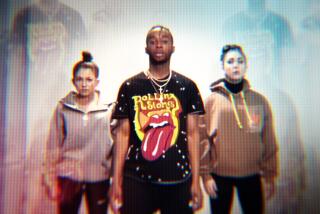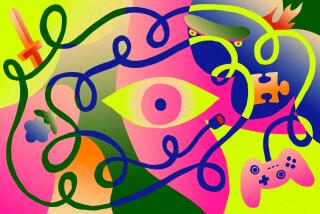Religious Groups Take Aim at Computer Game
- Share via
When employees at Shiny Entertainment talk about their forthcoming computer game “Messiah,” they sometimes joke about hiding under their desks to avoid the wrath of God.
Although the controversial title won’t be released until September, the company is already ducking the protests of outraged consumers and some Christian groups.
The game stars a small cherub who has been sent by God to clean up the streets of a futuristic Earth. To move around, the angel possesses the characters who inhabit the city’s seedy underworld--scantily clad prostitutes, shuffling street people and well-armed police officers, among others. Once inside the body, the angel can use the person to move, attack other characters and generally run amok.
Though the staff at the Laguna Beach firm says it realized the subject matter was controversial, executives say they are surprised by the public’s reaction.
“We’re talking about a fat little baby angel that’s trying to earn its wings by saving humanity,” said David Perry, Shiny’s president. “It’s crazy that all these people are already upset and they haven’t even seen the game.”
Although the game industry is known for testing social mores, “Messiah” is the first title that is blatantly playing up the Judeo-Christian angle, said Jeff Green, associate editor at trade magazine Computer Gaming World.
“You can’t use the word ‘messiah’ and not know you’re going to tweak the sensibilities of the religious community,” Green said.
The idea to feature an angel as a hero came from a staff brainstorming session, as did the title, Perry said. The game doesn’t directly refer to Jesus Christ and the title speaks of “a messiah, not the Messiah,” Perry said.
That doesn’t matter to several Christian organizations, one of which sent an e-mail note saying that Shiny is “violating the Catholic Church’s moral copyright” on the word.
Several dozen consumers also have e-mailed Shiny voicing their concerns.
Chris Palmer said he enjoyed playing a demonstration copy of Shiny’s shoot-’em-up “MDK”--or “Murder Death Kill”--and was browsing through the company’s Web site when he stumbled across information about the “Messiah” project.
“The word ‘messiah’ is such a powerful word, I just can’t ignore it or its connotations,” said Palmer, a programmer analyst for an insurance company in Pennsylvania. “I know there are a lot of things out there that already tarnish religious imagery. But I just can’t support a company that would throw around that word so lightly.”
Religious icons and terminology have become common fare in American popular culture. Observers point to the animated TV series “South Park,” which features Christ as the flip host of a public-access talk show. Other episodes have portrayed Christ as a rough-and-tumble sort, someone who has beaten up both Santa Claus and Satan.
Other computer game developers have tapped Christian references to name their work, such as AfterLife by LucasArts Entertainment. LucasArts has avoided using certain words--including “messiah”--because they are too emotionally loaded, executives said.
“But that was a couple years ago, and now it’s getting more and more crowded on the store shelves,” said Mike Stemmle, a project leader for LucasArts. “To really sell well, I think the industry is going to have to be more provocative with their products.”
Stemmle notes that most religious images in today’s games lean toward the dark side--devils, demons and satanic symbols. Even the top-selling game of last year--”Diablo,” by Blizzard Entertainment--was named after Satan and pits players against the devil.
“Evil is always sexier than good,” said Dan Lavin, a technology analyst with the research firm Dataquest. “The point of designing a computer game for a young boy is to enhance the rebellious elements. And this is a company seeping in rebellion.”
Indeed, for the last five years, Shiny has culled a loyal following because of its diverse catalog. Younger players flocked to “Earthworm Jim,” a game in which a worm slips into a magical suit and becomes an idiot-savant superhero. A much older crowd gravitated toward the action-laden “MDK,” where players hunt alien life forms.
“Messiah,” which is being made for both the personal computer and the Sony PlayStation--is aimed at a mostly male audience, age 17 and older, Perry said. But he acknowledged that players could be younger, “maybe 14 or 15,” so the firm is finding ways to make the PlayStation version more appropriate for teens.
The firm will also incorporate an industry-standard rating system on “Messiah,” just as it has done with all its earlier releases.
Despite the criticisms over the game’s religious implications, Perry said he’s confident the game’s technological advances will eventually overshadow the brewing controversy.
Shiny’s rivals have been anxiously waiting for the company to show off “Messiah” at a conference in May. Analysts say the new title could change the look of PC games in general.
In “Messiah,” each digital model has a bone structure, with muscles holding them together and a textured “skin” stretched over the top. So instead of characters that appear boxy or square, the cast looks fairly realistic with clothing that creases, muscles that flex and bosoms that bounce.
And by incorporating a design technique known as scaleability, the game adjusts the detail of the characters depending on what kind of computer the player is using.
“I realize that ‘messiah’ is a very powerful word, but we’re building a very powerful game,” Perry said. “It’s not a swear word. It’s not a taboo. It’s just a single, simple word.”






